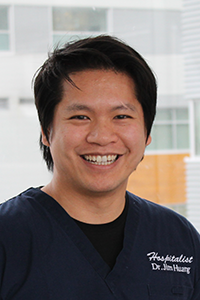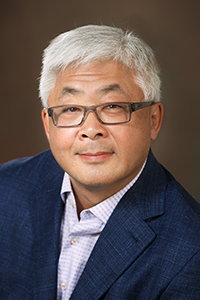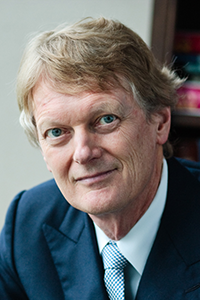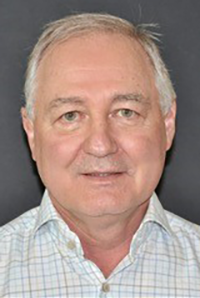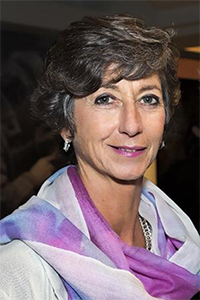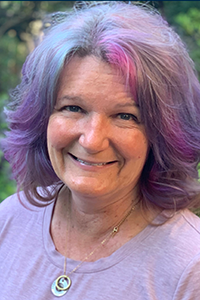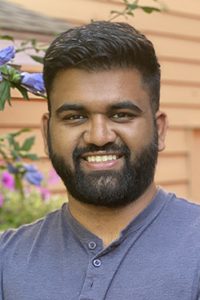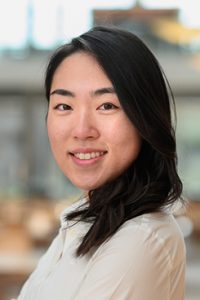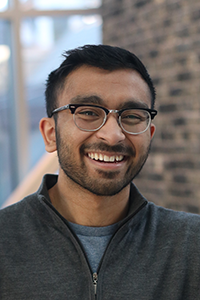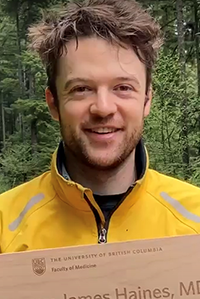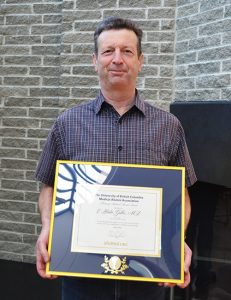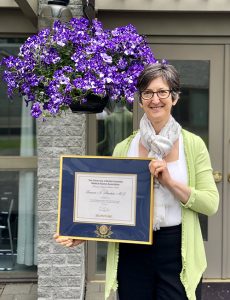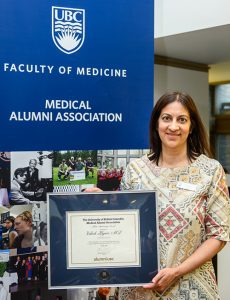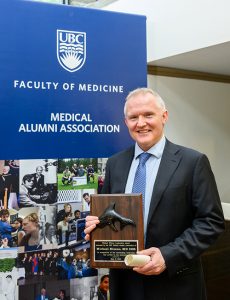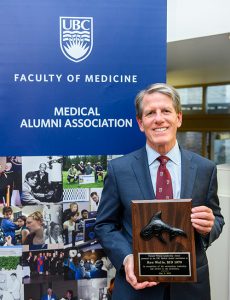360 degrees: A UBC BMLSc transformation from learner to educator
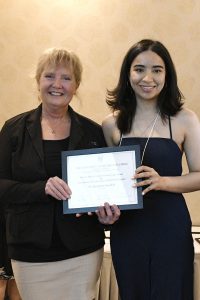
(Left) Jennifer Xenakis, BMLSc’06 receiving the Dr. Philip E. Reid Memorial Cup Award for Outstanding Contribution to the BMLSc Program, presented by BMLSCc Class of 2022 alumna, Claudia Singh
Dear new BMLSc graduates,
It is a great privilege to work with engaged, eager, intelligent people so full of energy and promise!
The BMLSc program is a journey that involves “dipping toes” into the pond of possibilities. What ignites students’ intellectual passions? Each student is a mosaic, woven by threads that have influenced their lives – parents, family, culture, friends, society. Teasing apart these threads to determine what part of their goal is externally controlled is important. What part is their true genuine self? What does success mean for this person? The process is time consuming and requires instilling confidence – confidence to respect and appreciate external influences while building an internal core of unshakeable faith in themselves so they may lead their own journey down the river of life. When I can help them to stop clinging to a particular outcome, to let go and trust that embracing their passion will lead them to a valuable, genuine and unique life, that is the most rewarding work.
Then comes graduation: a bittersweet event. Feeling emotions that are complex; incredibly proud of their achievements while knowing that I have to let them go. Trusting they will forge ahead with their life and do great things in their own unique way. Each one of them so valuable; so precious. I trust that they will be okay and that a new cohort of fresh new faces to start the cycle all over again.
Photograph: Jen Xenakis, BMLSc’06 receiving the Dr. Philip E. Reid Memorial Cup Award for Outstanding Contribution to the BMLSc Program, presented by BMLSCc Class of 2022 alumna, Claudia Singh
Sincerely,
Jennifer Xenakis
UBC BMLSc alumna, Class of 2006
UBC BMLSc educational services manager and honorary lecturer
AGM Page Old Content
Recap of Previous Events
Dr. Hamed Umedaly, BSc’81, MD’86, President of the MAA, was the host of the AGM portion of the evening. The MAA reviewed its key activities and financial statements from 2020, as well as an update on the status of the MSACs which remain closed. As this was Dr. Umedaly's last engagement as MAA President, Dermot Kelleher, Dean, Faculty of Medicine, and Vice-President, Health, UBC thanked him for his years of service, and the UBC MAA welcomed Dr. Jan Christilaw, MHSc’03, UBC MAA Honorary Medical Alumna 2016 into the role of MAA President. Dean Kelleher, Dean, Faculty of Medicine, and Vice-President, Health, UBC also gave the Faculty of Medicine report where he reviewed several research highlights, the creation of the Office of Respectful Environments, Equity, Diversity & Inclusion: REDI to provide leadership across the Faculty in the areas of professionalism, learner mistreatment, equity, diversity, and inclusion, anti-racism, and anti-discrimination, and the creation of a draft framework for a refreshed strategic plan, Building the Future 2021-2026.
The following Board Directors renewed their positions for another term:
- Vice President, Fraser Medical Program – Dr. John Edworthy
- Director, MD Admissions Subcommittee – Dr. David Chercover
Dr. Umedaly expressed his gratitude to departing Board Directors for their valuable contributions and dedication to the MAA and wished them well on their future endeavours:
- Dr. Thomas Kinahan, BSc’82, MD’84, Vice President, Southern Medical Program, 2012-2021
- Dr. Daphne Lu, BSc'14, MD'18, President, Resident Doctors of BC 2020-2021
- Billy Zhao, President, Medical Undergraduate Society 2020-2021
- Rhea Ashmead, MUS Site Lead, Island Medical Program 2020-2021
- Paige Murphy, MUS Site Lead, Northern Medical Program 2020-2021
- Lauren Hughes, BSc-O’16, MUS Site Lead, Southern Medical Program 2020-2021
Recording of 2021 Awards Ceremony
Dr. Christilaw was the host of the awards ceremony where the MAA had the honour to present the awards to the following award recipients:
2020-2021 alumni UBC Builder Award
2020 Wallace Wilson Leadership Award
2020 Honorary Medical Alumni Award
2019 Silver Anniversary Award
2020 Student Leadership Award
2021 Student Leadership Award
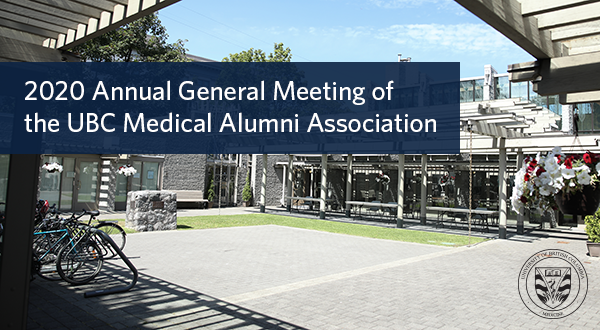
The UBC Medical Alumni Association (MAA) held its 2020 Annual General Meeting on October 20, 2020. Due to the COVID-19 pandemic, the event was hosted online.
Dr. Hamed Umedaly, BSc’81, MD’86, President of the MAA, was the host of the event and welcomed all our guests, who included MAA members, Board Directors, guests, and UBC staff.
First and foremost, Dr. Umedaly thanked UBC medical alumni and members of the medical community for their dedication and contributions to the COVID-19 response. He also thanked MAA members, the MAA Board, and UBC Faculty of Medicine staff for their ongoing support. Dr. Umedaly reviewed the key MAA activities from May 2019 to March 2020: the MAA AGM and Awards Ceremony and MD Student Hooding Ceremony in May 2019, UBC Medical Alumni & Friends Golf Tournament in June, raising $35,000, and the Alumni & Friends Summer Socials in Kelowna, Prince George, and Vancouver in July. The MAA also participated in the Victoria Medical Society Student Welcome Dinner in January 2020 and hosted Wine & Wisdom in February at the MSAC Vancouver. Due to the COVID-19 pandemic, the MSAC Vancouver was closed in mid-March and remains closed while UBC reviews plans for safely reopening spaces across the University.
Dr. Mike Allard, BSc’78, MD’81, Past President and the Faculty of Medicine Dean's Designate, shared highlights from the Faculty over the past year. In June 2020, the UBC Board of Governors approved the extension of Dermot Kelleher's appointment as Dean of the UBC Faculty of Medicine for a second five-year term, commencing September 1, 2020. The Faculty’s Strategic Plan, Building the Future, will be refreshed to build on past accomplishments, address the COVID-19 pandemic’s effects, such as virtual care and learning, and incorporate the Faculty’s new vision (transforming health for everyone) and values (respect, integrity, compassion, collaboration and equity). The Faculty is also creating the implementation plan on the recommendations from the Dean’s Task Force on Respectful Environments.
Dr. Umedaly expressed his gratitude to departing Board Directors for their valuable contributions and dedication to the MAA and wished them well on their future endeavours:
- Dr. Deborah Money, BSc’81, MD’85, Executive Vice-Dean, UBC Faculty of Medicine 2018-2020
- Dr. Daryl Leiski, MD’96, Vice-President, Northern Medical Program 2018-2020
- Dr. David Jones, BSc’67, MD’70, Director, Vancouver-Fraser Medical Program and previous MAA President 2000-2020
- Dr. Alana Fleet, President, Resident Doctors of BC 2019-2020
- Zach Sagorin, BSc’17, President, UBC Medical Undergraduate Society (MUS) 2019-2020
- Aaron Baker, MUS Site Lead, Island Medical Program 2019-2020
- Kian Draper, MUS Site Lead, Northern Medical Program 2019-2020
- Kaitlin Toplak, MUS Site Lead, Southern Medical Program 2019-2020
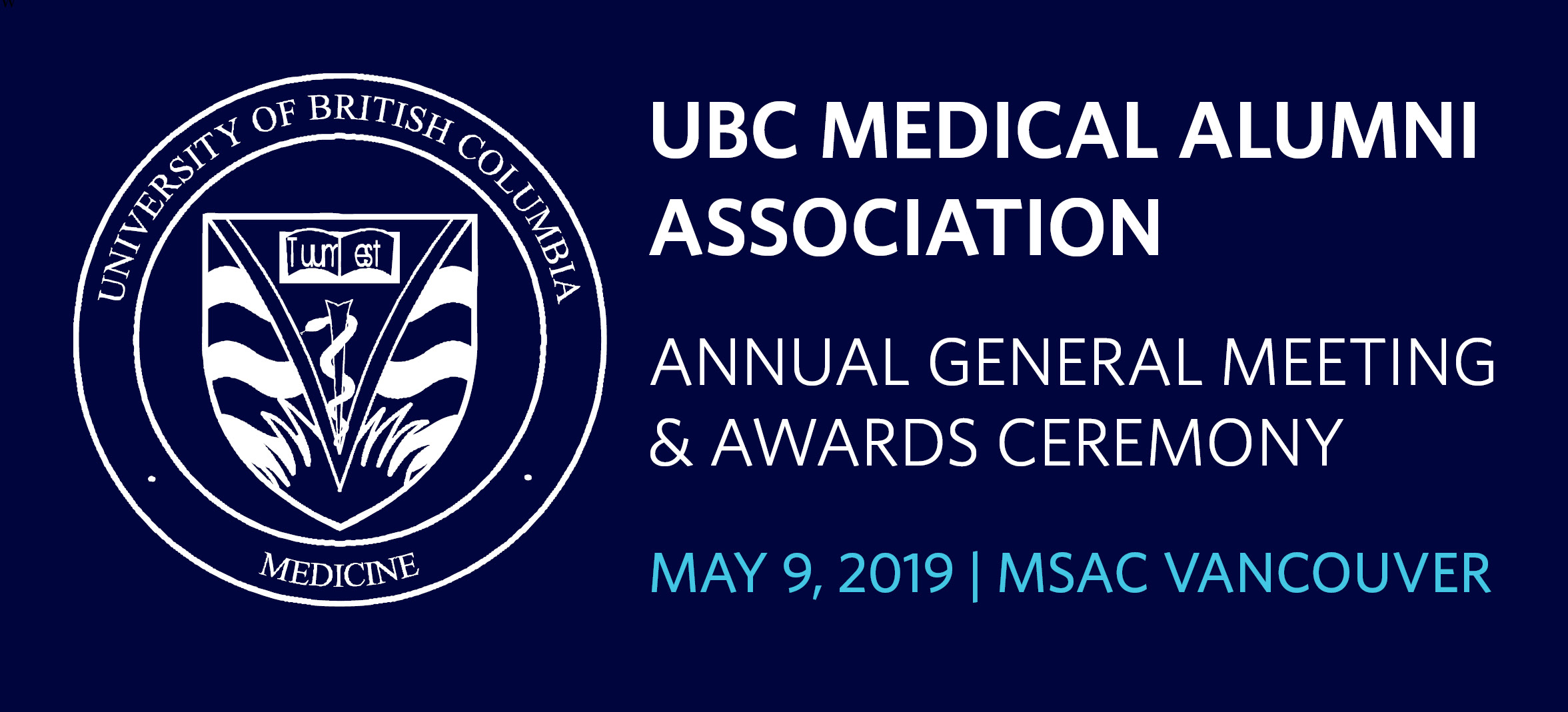
The UBC Medical Alumni Association (MAA) held its 2019 Annual General Meeting and Awards Ceremony on May 9, 2019 at the Medical Student & Alumni Centre (MSAC) in Vancouver. This incredible evening event allowed the MAA to share its successes of the past year with our honored guests and recognize members of the medical community for their outstanding accomplishments and commitment to their profession.
Annual General Meeting
Dr. Mike Allard, MSc'78, MD'81, President of the MAA, was the host of the event and welcomed all our guests, who included MAA members, alumni, family members, colleagues, and UBC staff. During the AGM portion of the evening, Dr. Allard highlighted the successes of the MAA in the past year, notably our events at the distributed sites and the annual UBC Medical Alumni & Friends Golf Tournament fundraiser. Dr. Roanne Preston, Department Head Representative on the Dean’s Executive Committee and Head, Department of Anesthesiology, Pharmacology & Therapeutics, shared the Faculty of Medicine's key achievements, most notably the launch of the Dean’s Advisory Council on Rural and Remote Health and the $70 million raised by the Development team.
Looking towards the future, Dr. Allard welcomed Dr. Umedaly into the MAA President role and Dr. Preston, in turn, thanked Dr. Allard for his three years of service as the MAA President and welcomed him into his new role as Past-President. Dr. Allard expressed his heartfelt appreciation to the five departing Board Directors - Dr. Nicholas Monfires, John Liu, Nick Brochez, Jenna Erwin, and Rosie Mazolla - and thanked them for their past year's service to the medical community.
Award Ceremony
During the Awards Ceremony portion of the evening, Dr. Allard had the honour to present the MAA Awards to our medical alumni:
- Wallace Wilson Leadership Award - Dr. Michael Nimmo (MD’95) and Dr. Ron Walls (BSc’75, MD’79)
- Silver Anniversary Award - Dr. Videsh Kapoor (BSc’88, BEd (Sec)’92, MD’93)
- Honorary Medical Alumni Award - Dr. Blake Gilks (MedRes’88) and Dr. Tamara Shenkier (MedRes'92)
The award recipients’ careers and achievements inspired us all to be as selfless and engaging towards the medical community and society as they have throughout their lives. This year, we presented our inaugural Student Leadership Award to MD undergardaute students Alec Yu and Eric Zhao (BSc'13) and wished them every success in their studies and future careers.
View photos from the event in the gallery below or visit our Flickr page.
2019 MAA Award Recipients
Click on our award recipients' photos to learn more about them!
Honorary Medical Alumni Award
Silver Anniversary Award
Student Leadership Award
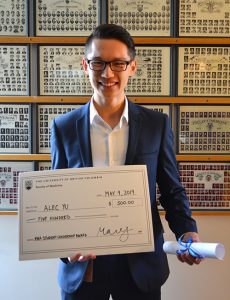 Alec Yu |
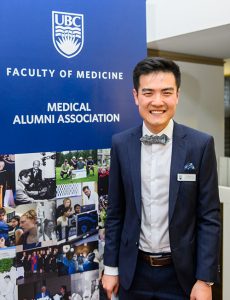 Eric Zhao (BSc'13) |
Wallace Wilson Leadership Award
Dr. Michael Allan, MD’96 – 2021 Silver Anniversary Award Recipient
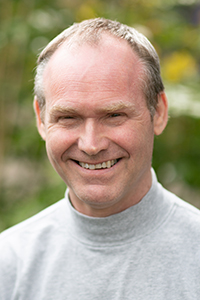 Dr. G. Michael (Mike) Allan is the Director of Program and Practice Support in the College of Family Physicians of Canada and Adjunct Professor in the Department of Family Medicine at University of Alberta. He has practiced for over 20 years, given 300 invited presentations, and published 150 articles. He contributes to a regular evidence-based update (called Tools for Practice) distributed to 40,000 clinicians and published in the journal Canadian Family Physician. He also co-presents a weekly medical podcast (on i-tunes) called Best Science Medicine podcast.
Dr. G. Michael (Mike) Allan is the Director of Program and Practice Support in the College of Family Physicians of Canada and Adjunct Professor in the Department of Family Medicine at University of Alberta. He has practiced for over 20 years, given 300 invited presentations, and published 150 articles. He contributes to a regular evidence-based update (called Tools for Practice) distributed to 40,000 clinicians and published in the journal Canadian Family Physician. He also co-presents a weekly medical podcast (on i-tunes) called Best Science Medicine podcast.
Dr. John Cairns, MD’68 – 2022 alumni UBC Builder Award Recipient
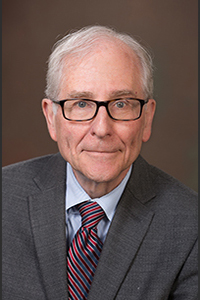 Dr. John Cairns was Dean of UBC’s Faculty of Medicine from 1996 to 2003. He led efforts, in conjunction with UBC and two provincial governments, to conceptualize, secure the funding for, and establish university partnerships to enable the doubling of medical student enrollment centered at UBC but distributed throughout the province.
Dr. John Cairns was Dean of UBC’s Faculty of Medicine from 1996 to 2003. He led efforts, in conjunction with UBC and two provincial governments, to conceptualize, secure the funding for, and establish university partnerships to enable the doubling of medical student enrollment centered at UBC but distributed throughout the province.
In 2020, Dr. Cairns co-authored Dreamers, Skeptics, and Healers, outlining the first 70 years of the faculty of medicine. The book features numerous alumni and the Medical Student & Alumni Centre, and has brought together alumni to celebrate the Faculty’s history.
Dr. Cheryl Holmes, MD’84 – 2022 alumni UBC Builder Award Recipient
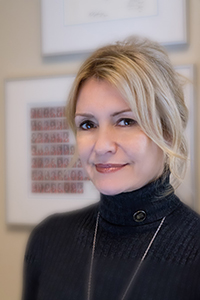 Dr. Cheryl Holmes is the Associate Dean, Undergraduate Medical Education and Head of the Division of Critical Care Medicine in the Faculty of Medicine. Dr. Holmes has played an instrumental role in the development of the Southern Medical Program based at UBC Okanagan and serves as an exceptional preceptor and mentor for countless students and residents.
Dr. Cheryl Holmes is the Associate Dean, Undergraduate Medical Education and Head of the Division of Critical Care Medicine in the Faculty of Medicine. Dr. Holmes has played an instrumental role in the development of the Southern Medical Program based at UBC Okanagan and serves as an exceptional preceptor and mentor for countless students and residents.
Mon Jef Peeters, BHK’04, MSc’08, MPT’11
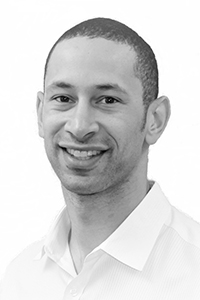
Mon Jef Peeters was born and raised in Squamish, British Columbia and his parents immigrated to Canada from Belgium and the Democratic Republic of the Congo. They instilled Mon Jef with a work ethic and enthusiasm for outdoor activities (e.g., hiking, camping). He has always enjoyed physical activity and has been fascinated by the human body. In adolescence, Mon Jef fell in love with basketball and strength and conditioning. The latter led him to pursue studies in kinesiology at UBC. Mon Jef feels fortunate to have had the opportunity to compete in university sport, but eventually shifted his focus to academics and more diverse pursuits. Presently, Mon Jef works as a physical therapist with Fit to Train Human Performance Systems. He enjoys spending time with his family, reading/podcasting, and filling his recreational time with standup paddleboarding.
What drew you to the Master of Physical Therapy at UBC?
My interest in human anatomy and physiology, participation in sport and physical activity, and thirst for greater knowledge working as a strength and conditioning coach.
What is your favorite memory from your time at UBC?
That’s hard to pin down. I attended UBC for 10 years! I would say the consistent theme throughout my experience at UBC would be balancing learning pursuits with social recreation.
What has been your journey since graduating from UBC?
I was fortunate to start my career with the company I am still with today upon graduation due to my past social and professional relationships. I have balanced my clinical work with some teaching as well as pursuing further education in the practice of manual osteopathy.
What do you find most interesting about a career in physical therapy?
The human body and all facets of the therapeutic process, including biology (i.e., anatomy, physiology), psychology (the mind is incredibly powerful and among the most complex systems we know of), and sociology (the interaction of therapy within the broader context of everything else that occupies us))
Where do you find inspiration?
My family. Time in nature. Earthly endeavours.
How has your identity affected your perspective on the field of physical therapy and your future pursuits?
As the child of immigrants, a visible minority, and growing up in a more rural community, I have always been aware of “otherness” or marginality. That forced me to be curious about my surroundings and question the ‘why’ of things. That informs all aspects of my practice and maintains my curiosity in the world around me.
What is one thing you hope to accomplish?
At present, my personal goal is to circumnavigate the larger lakes in the Lower Mainland area via standup paddleboard.
What does a healthy society mean to you?
I am a proponent of the concept of literacy being extended to all aspects of life. To me, a healthy society is one in which all peoples are proficiently literate with respect to reading/writing, information/digital media, science, health, cultural/social, financial, and legal enabling individual achievement for collective success.
Sally Lin, MPH’15
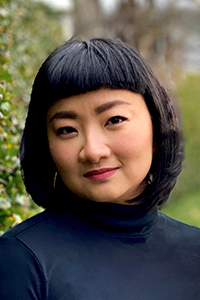 Sally Yue Lin (she/her) is a Senior Policy Analyst in the BC Public Service and a career coach serving equity-deserving professionals.
Sally Yue Lin (she/her) is a Senior Policy Analyst in the BC Public Service and a career coach serving equity-deserving professionals.
After graduating in 2015 from the UBC Master of Public Health (MPH) program, she worked in research administration and public policy in Coast Salish and Lekwungen territories (now known as Vancouver and Victoria). Her career goals are to make a meaningful impact on public policies in British Columbia and to uplift Indigenous, Black, and other racialized professional through providing financially accessible and identity affirming career coaching services.
Outside of work, Sally enjoys swimming, biking, and sewing.
What drew you to the Master of Public Health program at UBC?
I was interested in the UBC MPH program because I was interested in gaining epidemiology skills and to meet public health professionals working in BC, as I wanted to work in this province. I was working at UBC prior to attending the graduate program and I wanted to strengthen the relationships I had already built.
What is your favorite memory from your time at UBC?
I really enjoyed swimming at the pool in the mornings before going to class. It was really calming to swim laps and to mentally prepare myself for the school day. I worked part-time during my degree, so the early mornings were the only time I had to exercise, since the rest of my days were busy with class and work.
What has been your journey since graduating from UBC?
After I graduated from UBC, I worked for a year in health research for a large research institution in downtown Vancouver before relocating to Victoria for a position at the University of Victoria. I had three different positions within UVIC related to research administration, where I gained skills in project management, stakeholder engagement, event planning, and managing staff. Last year, I pivoted out of the higher education sector and joined the BC Public Service.
Following the death of George Floyd in 2020 and the subsequent protests, the BC government initiated the process for reforming the Police Act in BC; I wanted to contribute to this important initiative and accepted a position as a Senior Policy Analyst with the Ministry of Public Safety and Solicitor General.
What do you find most interesting about a career in public health?
What I love about a career in public health is how diverse the field can be. Since public health is inherently interdisciplinary, we can work towards similar goals in so many different areas. This diversity allows our careers to be expansive and ensure that we are never bored, stagnant, or stuck.
Where do you find inspiration?
I find inspiration from the people around me. One of the main reasons I enjoy mentoring and coaching is because it expands my horizons and exposes me to new perspectives. I also find inspiration through LinkedIn and seeing the career paths of other professionals in my network and beyond.
More generally, I find inspiration in nature and through art. I seek out the feelings of wonder and awe that can be found through observing the simple beauty of the everyday, as well as through grandiose marvels found in the extraordinary.
How has your identity affected your perspective on the field of public health and your future pursuits?
My intersecting identities as a racialized, queer, immigrant, woman has allowed me to empathize with communities that have also been “othered”, whether because of health diagnosis, social condition, or aspects of their lived experience. This is the reason I have gravitated towards working with people with lived experience of HIV, incarceration, homelessness, and marginalization.
In terms of my future pursuits, I plan to continue working closely with colleagues, stakeholders, and partners on important issues that impact British Coumbians. My identities and training in public health provides me with unique skills and experiences to work towards meaningful policy change in this province.
What is one thing you hope to accomplish?
I would like to eventually scale up my equity-driven career coaching services so that I can uplift and support even more people. Currently I only accept 3 clients at a time and only on weekends as I work a full-time job during the weekdays, but hopefully I can expand my services in the future.
What does a healthy society mean to you?
To me, a healthy society is equitable, sustainable, and resilient.
Al Boggie MD’54
 Congratulations to Dr. Alexander (Al) Boggie MD’54 who celebrated his 99th birthday on April 6!
Congratulations to Dr. Alexander (Al) Boggie MD’54 who celebrated his 99th birthday on April 6!
Dr. Boggie is a member of the first graduating MD class of the Faculty of Medicine. Amongst his many leadership roles held during his career, in the 1960s he returned to Vancouver and established a family practice residency at Vancouver General Hospital and as Associate Dean, Admissions for the faculty for many years his impact on alumni who attended UBC medical school in the 1980s and 1990s, continues to this day. Dr. Boggie is a consummate supporter of Medicine at UBC and was the co-president of the Constance Livingstone Friedman and Sydney Friedman Foundation. Best wishes Al on this landmark birthday!
